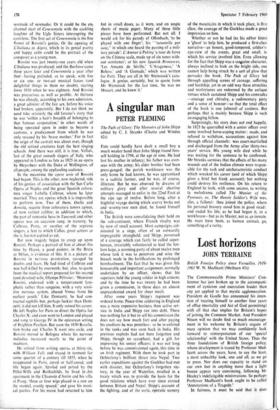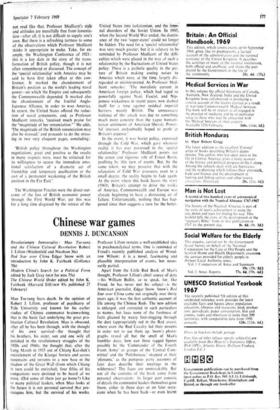British Foreign Policy since Versailles, 1919- 1963 W. N. Medlicott
(Methuen 45s)
Lost horizons
JOHN TERRAINE
The Commonwealth Prime Ministers' Con- ference' has just broken up to the accompani- ment of Cynicism and execration louder than any yet applied to that mystic agglomeration. President de Gaulle has announced his inten- tion of treating himself to another four years of office (mortality and Act of God permitting) with all that that implies for Britain's hopes of joining the Common Market. And President Nixon will no doubt find so much encourage- ment in his welcome by Britain's organs of mass opinion that we may confidently look forward to reinterpretation of our 'special relationship' with the United States. Thus the three foundations of British foreign policy, whose development is traced by Professor Med- licott across the years, have, to say the least, a most unhealthy look, one and all, as we go to press. Nor does our capacity to stand on our own feet in anything more than a light breeze appear very convincing, following Mr Healey's indefatigable ministrations. So perhaps Professor Medlicott's book ought to be called 'Annotations of a Tragedy.'
In fairness, it must be said that it does not read-like that. Jrcifessor Medlicott's Style and attitudes are mercifully free from lamenta7 tion—after all, it is not difficult to supply one's own. But there is a refreshing tartness to some of the observations which Professor Medlicott thinks it appropriate to make. Take, for ex- ample, the Washington Conference of 1921: this is a key date in the story of the trans- formation of British policy, though it is not often remembered or, discussed. The concept of the 'special relationship' with America may be said to have first taken effect at this con- ference. It marked the abandonment of Britain's position as the world's leading naval power—on which the Empire and subsequently the Commonwealth depended. It marked also the abandonment of the fruitful Anglo- Japanese Alliance, in order to woo America. In return, the United States offered the reduc- tion of naval armaments, and, as Professor Medlicott remarks, 'received much praise for the "magnitude of her renunciation."' He adds, 'The magnitude of the British renunciation may also be stressed; and proceeds to do the stress- ing in two very eloquent pages, concluding:
'British policy throughout the Washington negotiations, great and positive as the results in many respects were, must be criticised for its willingness to secure the immediate emo- tional satisfaction of a dramatic act of friendship and temporary pacification at the cost of a permanent weakening of the British position in the Far East.'
The Washington Treaties were the direct out- come of the loss of British economic power through the First World War; yet this was for a long time disguised by the retreat of the
United States into isolationism, and the inter: nal disorders of the Soviet Union. In 1945; when the Second World War ended, thedomin ance of the two 'super-states' could no !Oilier be hidden. The need for a 'special relaticinship' was very much greater; but it is salutary to. be
reminded by Professor Medlicott of the diffi- culties which were placed in the way of such a relationship by the fluctuations of United States policy. There is a pathetic quality in the pic- ture of Britain making cooing noises to America which were, at the time, largely dk- regarded or misinterpreted. As Professor Med- licott remarks: 'The moralistic current in American foreign policy, which had raged so powerfully against Nazi, Fascist, and Nip- ponese wickedness in recent years, now dashed itself for a time against residual imperial barriers, mainly British. The unnecessary violence of this attack was due to something much more concrete than the vague humani- tarian sentiments of American liberals.. Power- ful interests undoubtedly hoped to profit at Britain's expense.'
In the event, it was Soviet policy, expressed through the Cold War, which gave whatever reality it has ever possessed to the 'special relationship.' Professor Medlicott points Out the astute and vigorous role of Ernest Bevin, profiting by this turn of events. But, by the same token, we may perceive that with the relaxation of Cold War pressures, even to a small 'degree, the reality begins to fade again. At the point where this book leaves the story (1963), Britain's attempt to drive the troika of America, Commonwealth and Europe was already beginning to have a distressing air of failure. Unfortunately, nothing that has hap- pened since then suggests a turn for the better.







































 Previous page
Previous page